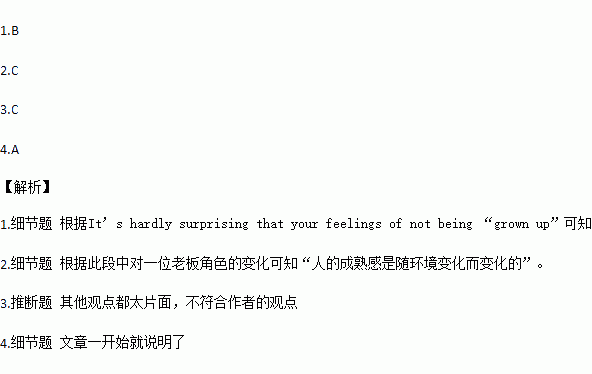题目内容
C
Dear David,
I’m glad you would like to share your feelings with me.It’s hardly surprising that your feelings of not being “grown up” have come on strongly at this point in your life,just before you’re about to become a father.You are asking:will I make a good father?How will I cope?
Should I have brought another little person into the world? Can l provide for it? Help! I think nearly every sensitive about-to-be-parent must have these occasional feelings of self-doubt and inadequacy(不适)before the birth and it would be most unusual if you didn't share them. It's difficult,honestly,to feel grown-up unless you have something less grown-up to relate to.
The boss with a hen-pecking wife may feel like a seven-year-old when he’s at home.But as he walks through the office door,and knows he’s going to be surrounded by staff looking to him for Advice,he grows into a fully mature man.And I think it’s a mistake to imagine that we all feel,as we age,a kind of progression of states,from the baby to the adult.Most people feel,on Tuesday, about three years old,and on a Wednesday,around 80.
There's a common remark that “all men are little boys”,but it's not true.It's more true that men often behave like little boys.But nearly all people,at some moments in their lives,are capable of groat maturity.
Once your baby arrives,you’ll soon feel less childlike,or rather,less often.When your child tries to put its fingers into the electric plug,the adult in you will rise up to prevent it.You’ll see
you have very little in common with a needy child,particularly if it's looking to you for comfort and support.
Comfort yourself,David,with two truths.One is that your friends laugh when they talk about this subject because they,like you,feel frightened.And remember that people who haven't grown
up don’t go around talking about the fact that they don’t feel grown-up.
Hope my advice will be helpful and good luck to you and your little one.
Yours sincerely,
Miss Advice
1.According to the passage,Miss Advice thinks David's self-doubt is .
A.valuable B.natural
C.unusual D.bearable
2.From Paragraph 2,we can learn that people's sense of maturity .
A.will increase with age
B.is obviously seen at home
C.changes with different situations
D.becomes stronger with familiar people
3.Miss Advice holds that .
A.all men behave like little boys
B.people tend to laugh at the subject
C.men with a baby feel more grown-up
D.people enjoy talking about their immaturity
4.Miss Advice wrote the letter to -
A.offer suggestions to a future father
B.teach people how to grow up
C.encourage people to be responsible
D.solve problems of the less grown-up

